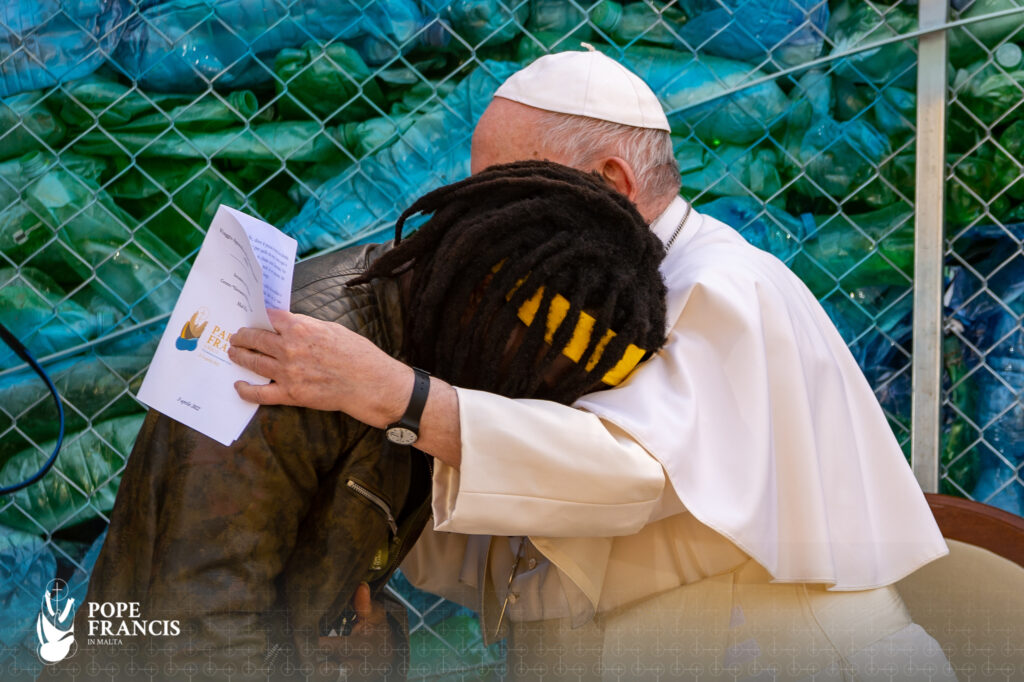
Article by Archbishop Charles Scicluna
As Pope Francis bade farewell to a relatively long queue of staffers and guests at the Apostolic Nunciature in Rabat towards the end of his two-day trip to Malta, he turned to me and said with a characteristic twinkle in his eye: “Questo congedo è stato più lungo di quello de La Traviata” (this farewell is longer than the one in La Traviata). Hearty laughter followed.
This was one of several light moments that kept him smiling through the visible knee pain he experienced during his Apostolic Journey to our islands. Yet, his remark also struck a poignant chord: just as Violetta, at the end of the famous Verdi opera, carries on singing in the face of adversity, here was the Holy Father, about to set off for the final act of his trip – a visit to the migrants centre run by Fr Dionysius Mintoff in Ħal Far.
As he presided over the Angelus at the Granaries, in Floriana a few hours earlier, he told youngsters: “Dear young friends, I want to share with you the most beautiful thing in life… the joy of giving ourselves completely in love, which makes us free.
He reminded us that Easter, this year set against a backdrop of war and aggression, is the light glowing softly in the darkness; life overcoming death; love winning hearts away from hatred
“That joy has a name: it is Jesus. I wish you the beauty of falling in love with Jesus, who is the God of mercy… who believes in you, dreams with you, loves your lives and will never disappoint you. Keep going forward always with Jesus, with your family and with the People of God; do not forget your roots. Speak with your elders, speak with your grandparents, speak with the elderly.”
His message could not have been more timely. He reminded us that Easter, this year set against a backdrop of war and aggression, is the light glowing softly in the darkness; life overcoming death; love winning hearts away from hatred. Easter is about radical healing that revitalises our very existence. It is not an abstract notion, plan or strategy. It is about a person, Jesus, who made the ultimate sacrifice, and calls upon us to deepen our faith and nurture it in hope.
The pope also called upon us to embrace the true spirit of joy and, as he effortlessly spread that sentiment to those gathered under a beautiful spring sunset at the national shrine of Ta’ Pinu, I could not help smiling at the irony; since ‘joy’ is what ‘gozo’ means in his native Spanish language.
“The chief concern of Jesus’s disciples,” the Holy Father said, “was not the prestige of the community or its ministers, its social standing or the fine points of its worship. No. They were impelled to preach and bear witness to the Gospel of Christ; for the joy of the Church is to evangelise”.
It would become a recurrent theme of his visit. He spoke of the joy of the good news; the joy of forgiveness; the joy of love and friendship; the joy of living in harmony with nature; and the joy of meeting the Risen Jesus at the empty tomb where humanity reaches its highest point of progress and evolution.
Prayer is central to achieving this joy, the pope told us, especially at Easter as we think of the humanitarian tragedy unfolding in war-torn Ukraine which continues to be bombarded in a “sacrilegious” war. “May we be tireless in praying and in offering assistance to those who suffer,” he said, and in seeking peace.
Along with peace, human beings need healing. Indeed, the Acts of the Apostles tell how people would vie with each other to stand in the shadow of Peter to be healed in the name of Jesus. And so it was in Malta for Francis as Peter’s successor, as emotional crowds lined the streets to catch a fleeting glimpse of the Holy Father – to greet him, thank him and ask for his blessing.
As I greeted the pope on his arrival at the start of his visit, I had asked him to pray for our healing, both physical and spiritual. In response, the Holy Father – who came to us in all his vulnerability and yet with all his spiritual strength – smiled: “And who shall pray for Peter?” “The people,” I told him. Our people, who once again displayed special and unusual kindness.
The article was first published in the Sunday Times of Malta
